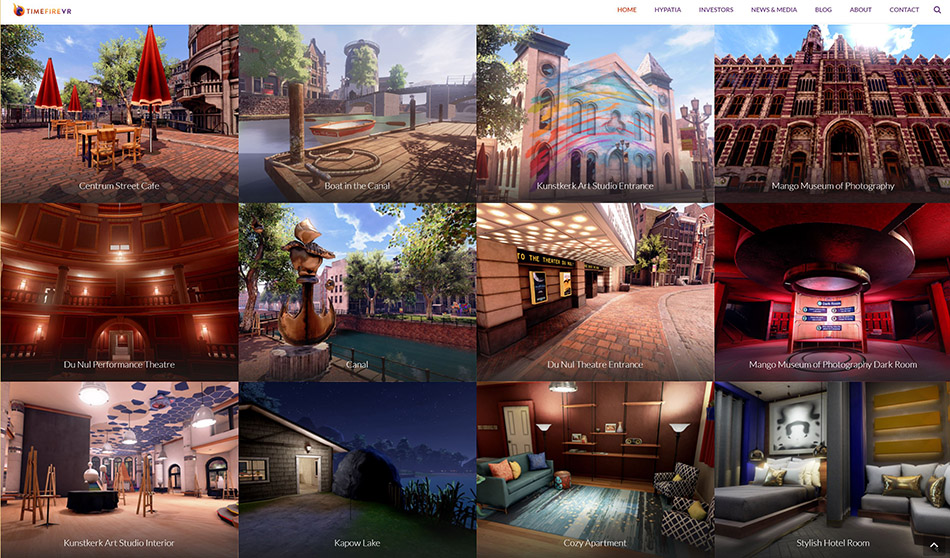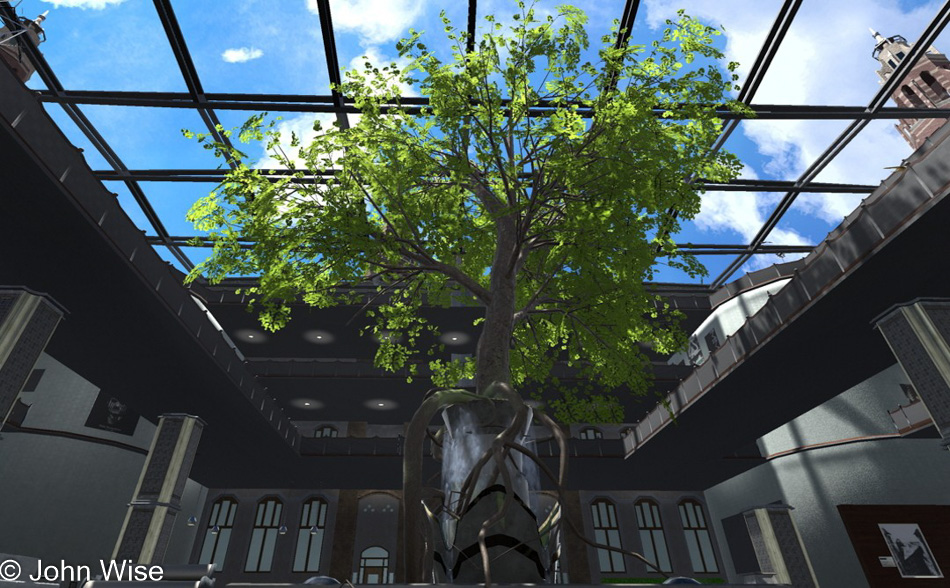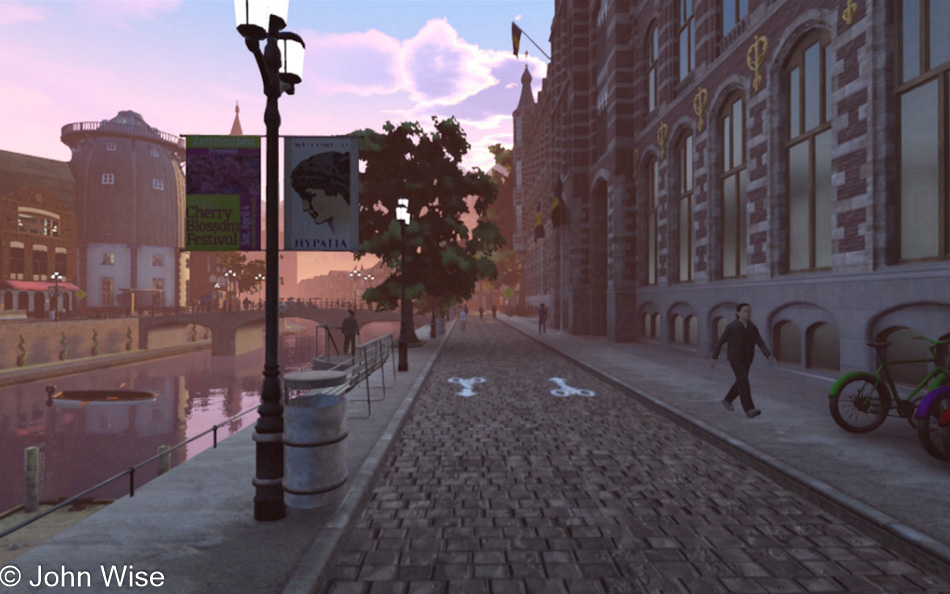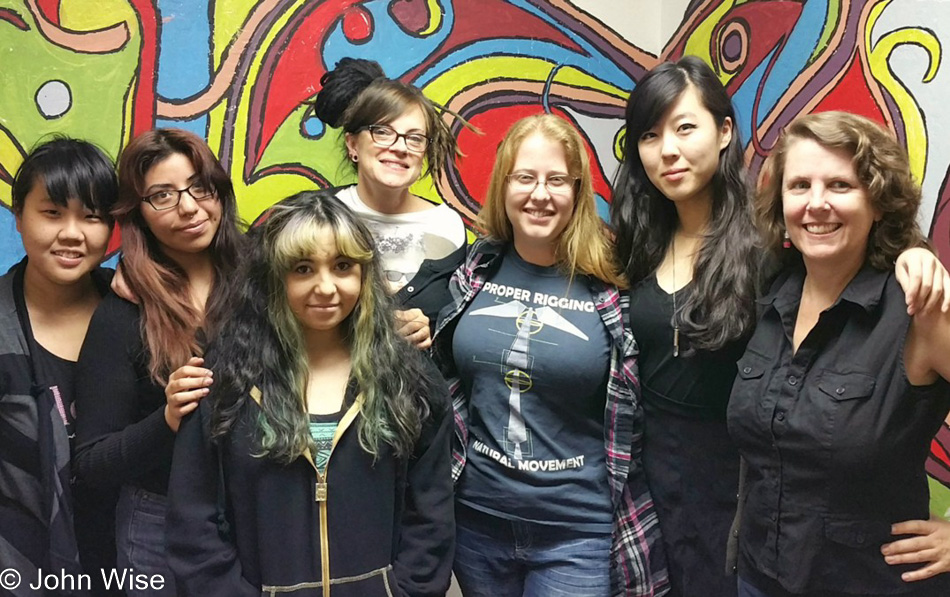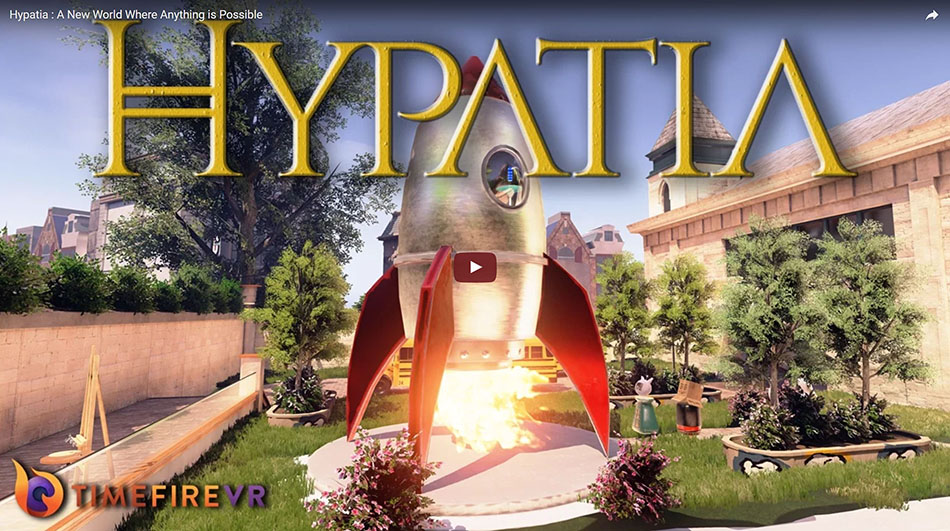
Three years ago my friend Jeffrey Rassás put together my first working capital, and we founded TimefireVR: a bunch of intrepid artists and developers starting on an endeavor to build a multi-player massive online social virtual reality application. We have now finally arrived at the day that it is being made available to the world. At midnight, our team launched the VR city of Hypatia. Over the years, many people have worked on this, and many are still striving to make it even better and will hopefully continue to do so for years into the future.
My ambition was to create a non-violent explorer who would go the extra mile to break down the geographic and economic barriers afflicting a large swath of all populations around our globe. It has been my belief that when we humans have the opportunity to play, explore, and extend our curiosity with others, we become better citizens of Earth, and more importantly, we become better persons to ourselves.
The original idea was born in 1994 while I was living in Frankfurt, Germany, with the working title “Zones.” Back then, many of us thought VR was about to be the next big thing, turned out that the next big thing would be the internet. Zones were to be an environment influenced by Berlin and Frankfurt where transmogrifying insectoids would morph in and out of reality as they explored a world of art that would deliver them into the surreal. Today, our VR city is named Hypatia in honor of the first known female intellectual. The avatars are scaled back for now and are known as “Hoverbots.” The environment initially borrows architectural influences from Amsterdam, while being immersed in an alternative universe should certainly qualify as being surreal. So maybe I’ve achieved a few of those objectives from all those years ago.
It took 23 years until the performance of computers, the speed of the internet, and the capability of headsets began to deliver the quality necessary to make VR viable, though, to me, it feels like it took nearly a lifetime. Now that it’s here, I’m amazed that I’ve had the incredible opportunity to participate in this groundbreaking paradigm shift in how we view reality and the virtual one we are creating.
What has been created here in Hypatia is not a simple game, not by a long shot. It is the culmination of an acquisition of knowledge that started with ideas of invention and exploration I had as a small child, leading me to discover the evolution of the mind of humanity as seen through the philosophical filter of Aristotle and Friedrich Nietzsche to the sociology of Jean Baudrillard and Jürgen Habermas. Growing up in Los Angeles, living in Europe, and learning about the proto-city of Çatalhöyük played their parts in how my perception would lay the foundation of a virtual city meant to be a cultural and educational epicenter of the future. I’ve stood in the living room of the James Ensor House in Ostend, Belgium, and listened to Mozart’s music on the streets of Salzburg in Austria. I’ve visited Eisenach, Germany, where Bach was born, and I walked through the Wartburg, where Martin Luther translated the bible. From World War II Japanese internment camps in the California desert to the Yellowstone Caldera over to the streets of Manhattan, I’ve studied who and what we are and how we have moved through history and shaped our cultures.
Whether rafting the Colorado River like John Wesley Powell or launching a rocket to deliver the first humans to the moon, there is an imperative for people to go out in search of the extraordinary. Unfortunately, not all of us can be so lucky. Virtual Reality can change that and afford humanity the opportunity to have a surrogate experience that allows us to touch the impossible. Hypatia is but a first step in helping teach the language of this new art and reality. Reduced to its very basics, the reality is nothing more than a configuration of energetic particles that form the basis and material that drive the perception of the universe around us. In VR we are on the verge of harnessing the placement of light and illusion of matter in a setting that soon will be indistinguishable from what we know to be reality. So, in a sense, we are creating a new universe that we can explore, where our real universe is too large for us to venture beyond our solar system.
All of this is important to me as I find that the discovery of novelty and a healthy relationship to learning intrinsically complex things essentially make up a fountain of youth. We are children once because we do not yet have a broad foundation of knowledge regarding the world around us. Our best moments of learning are found in play. We learn language with the help of family and friends who dote on us as infants, encourage our unintelligible sounds, and reward us with love and amazement. We extend our developing skills by the exploration of what is immediately around us, such as when parents fill the crib with toys, stuffed animals, a mobile, and musical devices. Then, it’s off to find the house before wandering into the backyard and then the park. Every step of the way, we are playing and venturing further out, and no one asks that we do more than that. We are not graded to talk, we do not receive marks for achieving an efficiency of play with our teddy bear. We do not pay children to go to make sandcastles or fire them when they do not win at hide-n-seek.
This age of innocence and exponential learning comes crashing to a halt as soon as we find out that our teachers are allowed to be disappointed with us and worse. They embarrass us and tell our parents that we are failures in their eyes; even our peers are allowed to wreak havoc on our developing sense of self by ridiculing us for not being as fast, as pretty, as smart, as tough, or as rich. After all of this social conditioning, we want well-balanced adults who are prepared to enter the workforce and not be burdened by mental illness, alcoholism, violent tendencies, or laziness. Our system is broken, yet while it’s wearing the Emperor’s New Clothes, many think it’s better than the alternative of the Emperor not wearing any clothes at all.
Someone has to step up and offer something different. While no one person or group is likely to have a universal answer that will solve the predicament that we as a society and global population are in, it is obvious we are in need of greater imagination and the ability to adapt to complexity. We must strive to discover alternatives to an education process that is not inspiring the generations to dream of going to the figurative moon.
If we cannot dream without fear of failure or laugh at the absurd that makes us challenge our perception of what is possible then I feel that we are heading into a cultural dark age. A large problem I have with that is that I cannot believe the opportunity that all of us have right before us here and now. We have greater access to knowledge than at any other time in human history, including even the recent history of just 20 years ago. We have access to tools that allow people with limited skills to develop a vocation by simply seeing it out and applying themselves. Music from across history is available immediately, as are billions of minutes of on-demand video that can share nearly any information or teach almost every topic known to us. Unless we are able to embrace what is difficult as we get older, stagnation can only harm our self-respect and the economic opportunity that we might have otherwise carved out for ourselves.
But who wants to try something difficult if it means we can get bad marks, be embarrassed by our peers, or find ourselves destitute because we were fired for not achieving the goals others have set for us? Play is just as important for the two-year-old as it is for the 12 and 72-year-old. Hypatia is a place where play takes center stage. Developing the city of Hypatia and inviting people in, we have witnessed over and over again people of all ages fall into amazement, followed by fits of joyous laughter and disbelief that they are exploring a magical place where it appears that all things are possible.
Over the years, investors asked me who our target market was, and they wanted specific answers, but they rarely asked for or wanted a truthful answer: our target market is not solely 12-17-year-olds. Our market is humanity from all walks of life, all religions, all colors, genders, orientations, or levels of intellectual and economic success. I understand this is too broad for most people to wrap their heads around; after all, they stopped dreaming big once they were pulled from the sandbox and dropped in front of a book about equations and rules of grammar.
Just as anyone reading this can see, I voluntarily conformed to the rules of spelling and was able to use common words to convey my thoughts in order for me to remain in the social fabric of cohesion. If left to my playful self, I can learn anything and enjoy staying within the shared rules that govern our ideas for civility that allow us to interact with one another. Hypatia is my attempt to create a playground where the sandbox of potential is forever within our grasp, allowing us to dip out of our competitive reality and re-energize our playful selves. One in which we are able to climb any monkey bars, go down the longest slide ever, swing until we spin around the bar, or build sandcastles of such epic proportions they would certainly lead us into magical underworld dimensions or stretch into the sky so far we might be able to touch Jupiter. We must dream of play and play to offer ourselves dreams worthy of inspiring our waking selves, so this life need not be of drudgery and fear of failure, anger, or violence.
It’s time for us to evolve. It’s time to take a step into the unknown and reclaim the pioneering spirit of our species that was never afraid to cross a desert, climb a mountain, travel an ocean, or risk everything to visit the bottom of the sea or the surface of the moon. Virtual reality may be the place where we all start to understand it is our place in this universe to explore, document, and share our discoveries so we might once again have stories of amazing adventures to tell each other around the campfire. Hypatia is my contribution to the story of the people of our Earth.
